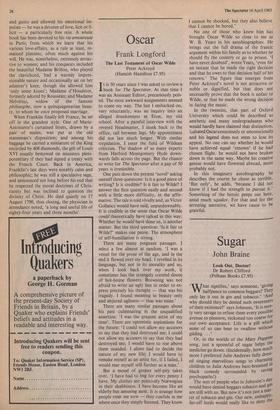Oscar
Frank Longford
The Last Testament of Oscar Wilde Peter Ackroyd (Hamish Hamilton £7.95)
T t is 50 years since I was asked to review a 'book for The Spectator. At that time I was an Assistant Editor, precariously pois- ed. The most awkward assignments seemed to come my way. The last I embarked on, very reluctantly, was an inquiry into an alleged drunkenness at Eton, my old school. After a painful interview with the revered Headmaster, I slunk back to the office, tail between legs. My appointment did not last much longer. With similar trepidation, I enter the field of Wildean criticism. The shadow of so many experts from Harford Montgomery Hyde down- wards falls across the page. But the chance to write for The Spectator after a gap of 50 years is irresistible.
One puts down the present 'novel' asking oneself three questions: Is it a good piece of writing? Is it credible? Is it fair to Wilde? I answer the first question easily and second with a little more difficulty, in the affir- mative. The tale is told vividly and, as Victor Gollancz would have said, unputdownably. It is credible in the sense that Oscar Wilde could theoretically have talked in this way. Whether he would have done so, is another matter. But the third question: 'Is it fair to Wilde?' makes one pause. The atmosphere of self-humiliation is strong.
There are many poignant passages. I select a few almost at random. 'I was a vessel for the prose of the age, and in the end it flowed over my head. I revelled in its language, but not in its morality and so, when I look back over my work, it sometimes has the strangely scented doom of hot-house flowers. Browning was not afraid to write an ugly line in order to ex- press precisely his thought — that was his tragedy. I found meaning in beauty only and abjured ugliness — that was mine.'
There are many similar passages about his past culminating in the unqualified assertion: 'I was the greatest artist of my time'. There are optimistic aspirations for the future: 'I could not allow my accusers to say that they had destroyed me; I could not allow my accusers to say that they had destroyed me; I would have to rise above them unaided. I alone had to decide the nature of my new life; I would have to remake myself as an artist for, if I failed, I would mar myself still further as a man.'
But a mood of greater self-pity takes over. 'I have had to beg for every penny I have. My clothes are positively Norwegian in their shabbiness. I have become like an elderly but amusing aunt. It is strange how people treat me now — they confide in me where once they simply listened. They know
I cannot be shocked, but they also believe that I cannot be bored.'
No one of those who knew him has brought Oscar Wilde so close to me as W. B. Yeats in his autobiographies. He brings out the full drama of the frantic argument within his family as to whether he should fly the country or go to prison. 'I have never doubted', wrote Yeats, 'even for an instant that he made the right decision and that he owes to that decision half of his renown.' The figure that emerges from Peter Ackroyd's novel is not attractive or noble or dignified, but that does not necessarily prove that the book is unfair to Wilde, or that he made the wrong decision in facing the music.
In the twenties, that part of Oxford University which could be described as aesthetic and many undergraduates who would hardly have claimed that distinction, iiiitated:Oscarconsciously or unconsciouslY and his legend does not seem to lose its appeal. No one can say whether he would have achieved equal 'renown' if he had chosen flight, he would not have broken down in the same way. Maybe his creative genius would have flowered abroad, more probably not.
In this imaginary autobiography he describes the course he chose as terrible. 'But only', he adds, 'because I did not know if I had the strength to pursue it.' Something of the heroic peeps out here, amid much squalor. For that and for the arresting narrative, we have cause to be grateful.










































 Previous page
Previous page